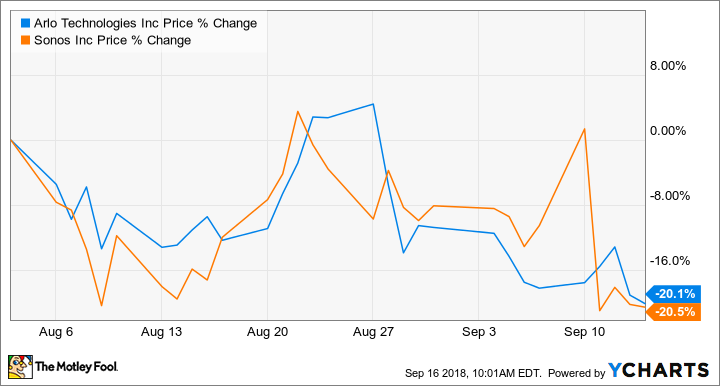Smart-home tech companies Arlo Technologies (ARLO 3.11%) and Sonos (SONO 3.02%) went public a day apart and priced their initial public offerings almost identically. Their stocks have moved in virtual lockstep since then, and as of this writing, both sit 20% below where they opened on their respective first days of trading.
Now that each has issued a first earnings report as a public company, and equally disappointed the market, let's take a look at which stock is the better buy -- or whether neither of them should be touched.
Got an eye on you
Spun off from networking device manufacturer Netgear, which still owns 84% of the company, Arlo Technologies is the premier manufacturer of wireless home-security cameras, with a 40% share of the market by dollar sales.
Revenue in the second quarter jumped 40% from last year, due primarily to the continued rollout of its Arlo Pro 2 battery-operated, weather-resistant Wi-Fi camera, launched in the fourth quarter of 2017. Overall, the number of devices shipped in the quarter grew by 32% to over 1 million, while registered users for Arlo's cloud-based monitoring platform more than doubled to 2.2 million.
That last is important because Arlo Technologies is attempting to make the big leap from hardware maker to services provider. It's not abandoning the hardware market, but rather is looking for its monitoring services to make up the larger part of its revenue stream; those services are recurring, and wouldn't require forcing an upgrade cycle on customers to increase revenue, as is the case with its security cameras.

Image source: Arlo Technologies.
Although user growth was impressive, segment revenue is underwhelming and actually growing at a slightly lower rate than hardware revenue. It also still represents just a small percentage of the total. It won't be making an impact anytime soon, and Arlo is certainly not guaranteed to successfully transition to the new business model.
Moreover, Arlo is in a highly competitive field; it faces significant pressure from rivals Amazon.com and Alphabet's Google, with their Ring and Nest businesses, respectively.
Arlo posted a GAAP (generally accepted accounting principles) net loss of $0.29 per share. It warned that it anticipates incurring losses for at least the rest of the year, though much of that will be due to one-time expenses related to separating from Netgear.
It remains the leader in wireless connected cameras, but with feature-rich, lower-priced cameras from its rivals hitting the market, that may not be the case for long.
Sounds of silence
Sonos also has the unenviable task of taking on bigger, much better financed rivals in the home speaker market. The maker of wireless multiroom home audio products (such as smart speakers, home theater speakers, and stereo components) is going up against the likes of Amazon, Apple, and Google, which have established themselves as the leaders in the smart speaker square.
Although Sonos is directly competing in that particular niche with speakers that are voice-activated but primarily designed to provide an enhanced premium listening environment, that's also the market Apple has targeted for its HomePod. Sonos also faces the prospects of Bose expanding its relationships into the specialist channel, along with Samsung's Harman Kardon entering the market.

Image source: Sonos.
Sonos' fiscal third-quarter earnings report was hardly inspiring, as competition seems to be pushing pricing lower. Although the company saw an 11% increase in the number of products sold, revenue of $208 million was 6.6% lower than a year ago, which it attributed to declining sales of its pricey ($699) Playbase, a speaker system that serves double-duty as a TV stand, and higher sales of the relatively lower-cost ($199) Sonos One, an Alexa-enabled device in a Sonos smart speaker.
Sonos does have a loyal base of users, with 38% of product registrations coming from existing customers, however, continuing to grow the business by trying to sell more products to the same people year after year has its limitations. It also may explain why revenue has grown only 8% annually over the last three years.
The smart choice in smart-home tech
Neither company seems like a particularly great buy. If forced to choose, I'd give the edge to Arlo Technologies because as Roku is proving, switching to a services model, although difficult, can be done. The slow growth model of Sonos inspires less confidence, particularly because it's going up against the technology world's leaders even as it faces more homegrown competition.
Arlo has some of those same concerns, which is why it's not getting a ringing endorsement. It's also why I won't be buying shares of either company until they can prove their businesses can stand the heightened competition.






